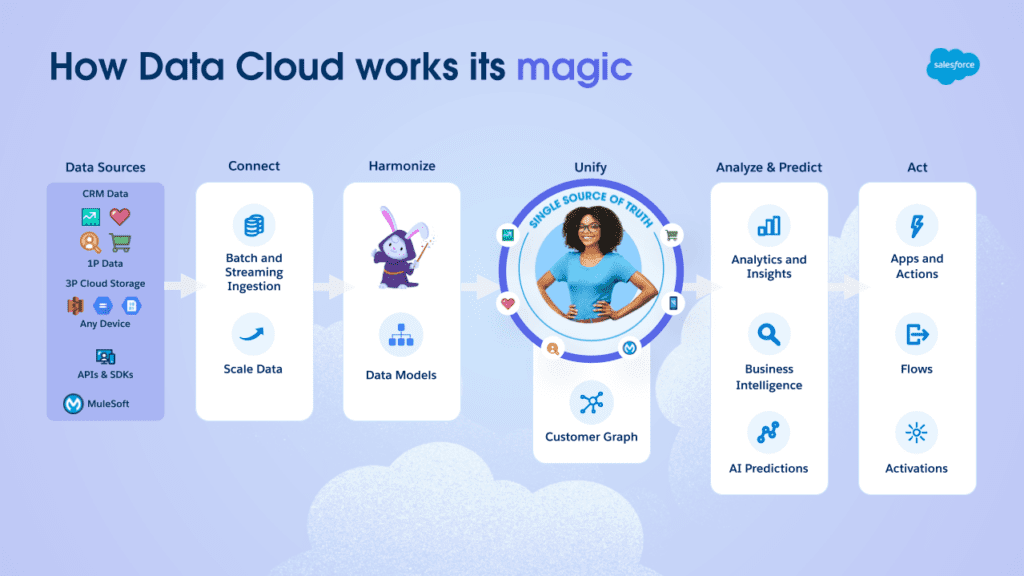Salesforce’s Data Cloud is an innovative Customer Data Platform that has come to market in the last three years, and made significant strides in building a highly capable, complete customer data platform including recent innovations in AI. In this article we outline the platform and its recent trajectory to arrive in the leader’s quadrant in Gartner’s Magic Quadrant™ for Customer Data Platforms (CDP).
About Data Cloud
Data Cloud is Salesforce’s hyperscale data engine, a key component of the Einstein1 Platform that combines structured and unstructured data to provide a 360-degree view of a company’s customers. This enables employees from any team to easily view and act on real-time customer data across all product and service engagements. Data Cloud also powers automation, predictive, and generative AI and analytics for Salesforce cloud offerings.
Before Data Cloud, Salesforce was built to deal with mostly transactional data. Data Cloud augments the core Salesforce offering and existing transactional database with the ability to take in massive volumes of data in real time and is built using Salesforce metadata, meaning data stored in Data Cloud is visible and available to be used by Customer 360.

Understanding the power of a unified Customer Data Platform and the Data Cloud capabilities is best illustrated by examples of the customer experience:
- Imagine a lost credit card reported stolen at 3 p.m. If the merchant uses Data Cloud for Commerce and receives real-time notifications, someone trying to use this card at 3:05 p.m. would be blocked.
- You contact customer service regarding a product issue. Due to Data Cloud for Service, the organisation automatically pauses marketing and sales communications with you until your issue is fixed. You avoid common, unpleasant interactions that drive clients away, like getting an email offer to buy the product you’re having trouble with.
- After clicking a marketing email link, a website’s personalised offer changes quickly. Data Cloud for Marketing makes that offer more relevant to you than the one you’d ordinarily look at, enticing you to buy.
- Urgent healthcare is needed. Your healthcare professional can use real-time patient data to provide proactive care in milliseconds.
The ingestion of realtime data, its harmonisation, and integration into a single view of customer provides powerful capabilities for firms. Companies can personalise experiences with a uniform profile and real-time data across virtuall any industry. These experiences show that milliseconds matter.
What’s Different with Data Cloud?
Salesforce will assert that other CDPs (Tealium, Teradata, Adobe and others) were developed for marketers, making them unusable by other business activities without specialised solutions, APIs, queries, and numerous calls. The additional complexities, misfit app ecosystem and difficult integrations can impose penalties on these solutions. To unlock AI and fully bring silo’d, disparate data to life, and improve customer experiences in the flow of work, companies had to design and manage specialised solutions.
Despite efforts to centralise data and provide a 360-degree customer perspective in their CRM, the majority of firm data remains disjointed, rendering it worthless or only partially useful in improving customer experiences. Given the quantity of data that organisations acquire, 80% of customers expect their customer experiences to improve.
Many clients have invested in moving their data to the cloud and establishing data governance standards. Some have even invested in CDPs designed specifically for marketers. Why? Marketers are concerned about imprisoned consumer data that cannot be easily accessed or used without custom APIs and frequent requests to the data team. CDPs exist, but they don’t always satisfy expectations.
Data Cloud takes advantage of the potential of Salesforce information by utilising an architecture that is native to the Einstein 1 Platform and is both open and expandable (BYOL, BYOM, zero-ETL interface). As a result of this flexibility, businesses are able to ingest or federate data from all sources, such as Snowflake (which will be generally available in March), AWS Redshift (which is currently in pilot), Google BigQuery (which will also be generally available in March), and Databricks (which is currently in pilot), harmonise and unify the data in order to power automation, activation, and analytics, and take action across sales, service, marketing, commerce, and other customer engagement scenarios.
Data Cloud provides a quick and secure entry into predictive and generative artificial intelligence by combining the power of structured and unstructured data. This helps to ensure that the results are correct, relevant, and based on client data.
High Level Capabilities
Data Cloud represents a feature rich engine to support unified customer profile and activity modelling and has a number of high level capabilities that have particular synergies with the rest of the Salesforce ecosystem including Customer 360, Salesforce Marketing cloud and Mulesoft, amongst others.
- No-code integration, allowing companies to ingest and transformation their complete enterprise’s customer data into Salesforce via Data Cloud without development of custom API integrations or coding. This Zero ETL approach leverages connectors extensibly – collaborations with Snowflake, Databricks, AWS, and Google have been formed in order to implement zero-copy/ETL functionality within Data Cloud.
- Further, Salesforce connectors allows clients to integrate data across their Salesforce investments in only a few clicks. There are multiple out-of-the-box pre-built connectors to cloud storage platforms such as Amazon S3, and the inclusion of MuleSoft (an acquired Salesforce product as of 2018, at the time the leading integration product globally) now allows clients to seamlessly integrate absolutely any system or data type to Data Cloud.
- Forming a comprehensive 360 degree view of the customer to enhance customer engagement insights. Data Cloud supports data quality and cleansing to rectify source data without the need for supplementary ETL tools post-integration. Organisations can effortlessly establish a unified view of their customers by mapping their enterprise data to a common model via an intuitive interface. Identity Resolution is a key feature that help model a unified perspective of customers across data profiles; one that is then accessible throughout the entire product and service portfolio.
- Deep analysis and prediction of customer patterns through AI/BI insights on the unified data. Whether it is generating novel insights such as churn score or lifetime value, or utilising our Bring Your Own Model (BYOM) technology to implement a company’s proprietary AI models.
- Activating data throughout the customer experience. Since Data Cloud is designed to operate seamlessly on the Einstein 1 Platform. The feature integration maximises the value of each customer engagement by leveraging BI and AI insights to drive remarkable activations across Customer 360 spanning paid-media, privacy-safe AdTech activation, sales, service, marketing, ecommerce, and more.
Use cases that Salesforce have shared in their collateral include:
- Mascoma Bank uses Financial Services Cloud with Data Cloud to see a customer’s entire relationship with the bank and understand activity surrounding the customer and their accounts. By using Salesforce as its single source of truth for all customer, account, and transaction data, bankers are now better equipped to help their clients reach their financial wellness goals.
- Heathrow Airport uses Salesforce Data Cloud and Einstein — ingesting and processing the real-time data of tens of millions of passengers — to personalise interactions with customers. This enables the the airport to provide the right services to the right passengers at the right time. Data and AI-powered experiences also allow the airport to anticipate passenger needs before their next airport visit.
- FedEx’s investment in Salesforce Data Cloud integrates customer service, marketing, and sales, supporting numerous improvements to their customer experience: giving the customer a more informed, efficient, and personalised customer journey.



